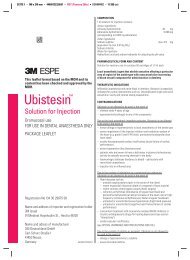EU HRT Core SPC update
EU HRT Core SPC update
EU HRT Core SPC update
You also want an ePaper? Increase the reach of your titles
YUMPU automatically turns print PDFs into web optimized ePapers that Google loves.
For treatment of post menopausal symptoms, the lowest effective dose should be used.<br />
For initiation and continuation of treatment of postmenopausal symptoms, the lowest effective<br />
dose for the shortest duration (see also section 4.4) should be used.<br />
Additional information on special populations<br />
Children and adolescents<br />
Angeliq is not indicated for use in children and adolescents.<br />
Geriatric patients<br />
There are no data suggesting a need for dosage adjustment in elderly patients. In women aged<br />
65 years or older, see section 4.4.<br />
Patients with hepatic impairment<br />
In women with mild or moderate hepatic impairment, drospirenone is well tolerated (see<br />
section 5.2. Pharmacokinetic properties). Angeliq is contraindicated in women with severe<br />
hepatic disease (see section 4.3).<br />
Patients with renal impairment<br />
In women with mild or moderate renal impairment, a slight increase of drospirenone exposure<br />
was observed but is not expected to be of clinical relevance (see section 5.2). Angeliq is<br />
contraindicated in women with severe renal disease (see section 4.3).<br />
4.3 Contraindications<br />
• Undiagnosed genital bleeding<br />
• Known, past or suspected cancer of the breast<br />
• Known or suspected estrogen-dependent malignant tumours (e.g. endometrial<br />
cancer)<br />
• Untreated endometrial hyperplasia<br />
• Previous or current venous thromboembolism (deep venous thrombosis, pulmonary<br />
embolism)<br />
• Active or recent arterial thromboembolic disease (e.g. angina, myocardial infarction)<br />
• Acute liver disease, or a history of liver disease as long as liver function tests have<br />
failed to return to normal<br />
• Known thrombophilic disorders (e.g. protein C protein S, or antithrombin deficiency,<br />
see section 4.4<br />
• Severe renal insufficiency or acute renal failure<br />
• Known hypersensitivity to the active substances or to any of the excipients<br />
• Porphyria<br />
4.4 Special warnings and precautions for use<br />
For the treatment of postmenopausal symptoms, <strong>HRT</strong> should only be initiated for symptoms<br />
that adversely affect quality of life. In all cases, a careful appraisal of the risks and benefits<br />
should be undertaken at least annually and <strong>HRT</strong> should only be continued as long as the<br />
benefit outweighs the risk.
















